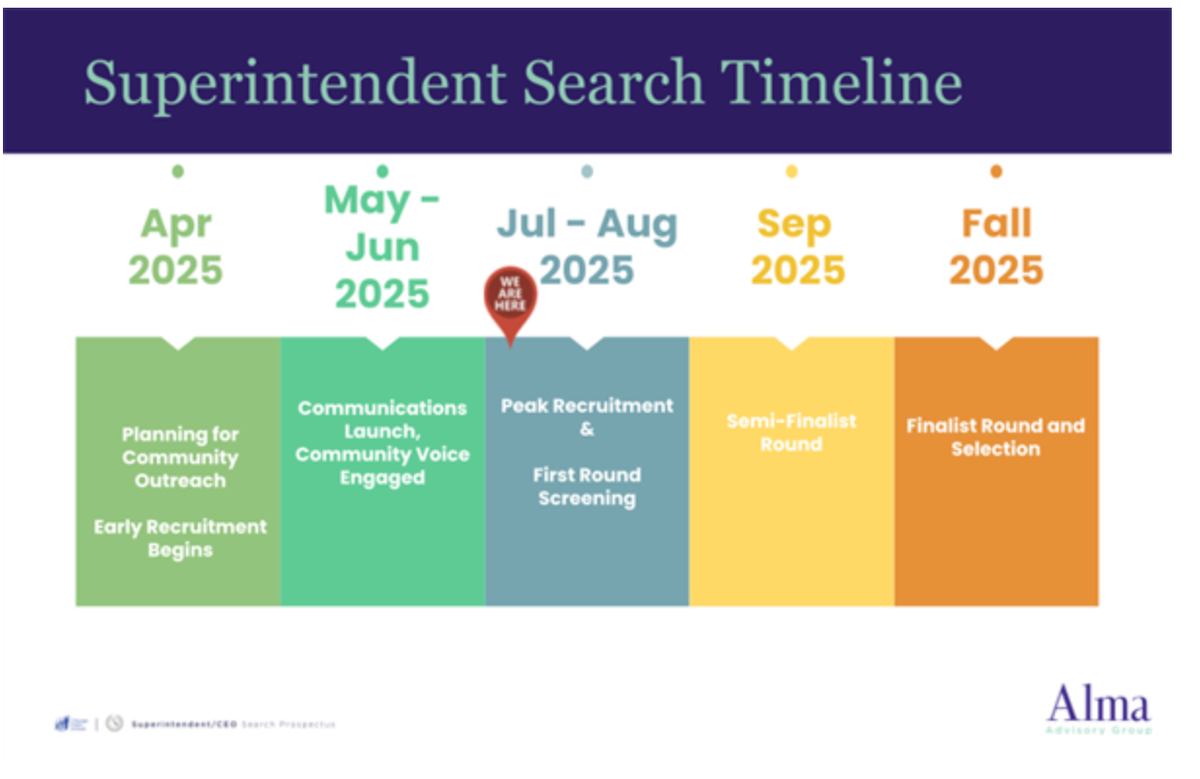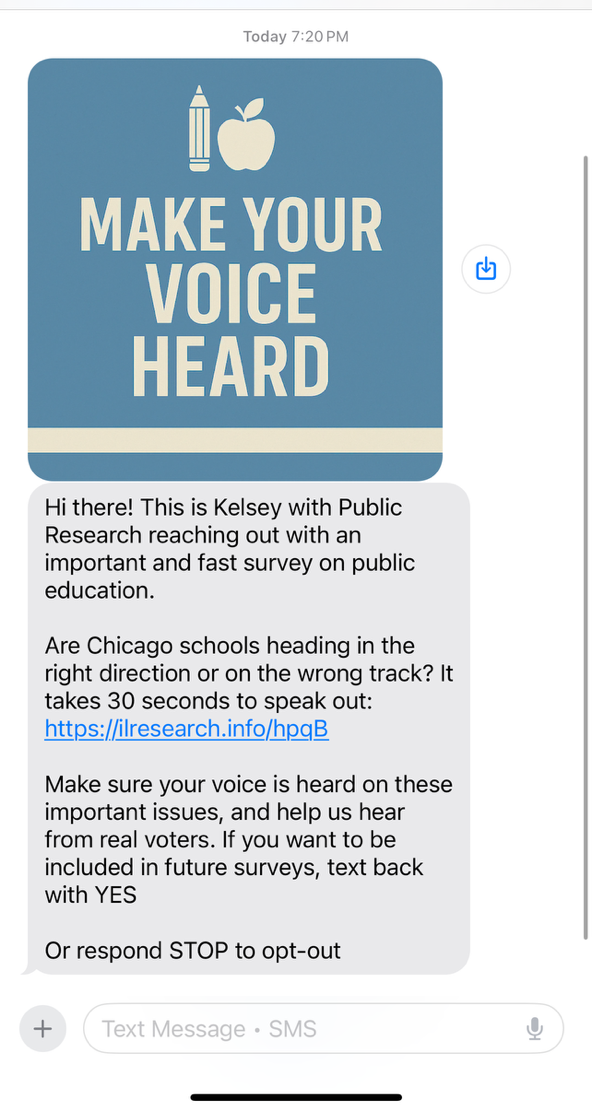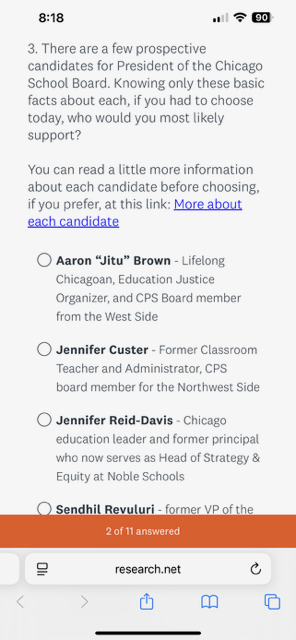Super Search, Next Board Prez?
More than 50 people are already vying for the superintendency of Chicago Public Schools. But the jockeying to run for school board president is just getting started.

Given the furor last week over potential budget cuts to Chicago Public Schools, it's no surprise that the update about the superintendent search didn't make it into news stories after the board meeting. But there is some news.
Board member Jessica Biggs, who heads the board's search transition team, reported that more than 50 people have already applied for the job. The public will be invited back into the search once finalists have been identified, and will have an opportunity to hear the finalists and offer feedback about them before the board makes a final decision.
The other board members on the search team are Debby Pope, Norma Rios-Sierra and Che "Rhymefest" Smith. For more on the sear h, check out:
The job prospectus,
The Zencity survey of Chicagoans' views on the school district and key qualities its next leader should possess, and
The board website's Superintendent/CEO Search page.
Who Will Be Our Next School Board President?
Already? We're asking this already? If that's your first thought, I don't blame you. But if you weren't asking this question already, a polling operation sure is.
Just a few days ago, I was forwarded the images below. (My number wasn't on the list for this text-based poll, but I have received texts from The Urban Center, which has been trying to resurrect tax-credit scholarships in Illinois.)


Jitu Brown and Jennifer Custer are, of course, current elected board members. Jennifer Reid-Davis is a former Noble Network of Charter Schools principal who rose to senior leadership in the network as chief strategy and equity officer. Sendhil Revuluri is a former school board member who was appointed by Mayor Lori Lightfoot.
According to the state Board of Elections database, as of late July, Sean Harden, the board's current, appointed president, does not have a fundraising committee in place to run in the November 2026 elections. I've heard two other elected board members' names mentioned as possible candidates for board president.
Budget Woes Get Realer; Charters Say, "Us Too"
On Friday, Chicago Public Schools sent out its weekly update to parents detailing budget-related changes they'll see to school cleaning, meal service, technology, school start times, and the availability of crossing guards and Safe Passage workers. Cold meals, packaged snacks, waits for non-essential building repairs, and reductions in the availability of physicals and vaccines at school. (This list of school-based health centers shows whether they serve only enrolled students, only CPS families, or are open to everyone.)
The reduction in crossing guards hit particularly hard in the 19th Ward (which includes Beverly, Morgan Park, and Mount Greenwood). Ald. Matt O'Shea has called for an investigation into how the locations losing crossing guards were chosen. I have been told that Safe Passage contracts, which are currently being renegotiated, may be changed to allow Safe Passage workers to be trained to help children cross the street.
While there's no sign yet that a special legislative session will come to rescue CPS, state Rep. Ann Williams is holding a subject matter hearing on the CPS financial situation tomorrow, Thursday, July 31, at 10 a.m. Details here. If you'd like to speak at the hearing, you can file a witness slip. On the day, you'll be able to watch the hearing here.
As evidenced at last week's board meeting, charter school advocates would like to remind everyone that charters administered by CPS suffer from a unique form of budget shortfall. Lori Turner, chief of political affairs for the Illinois Network of Charter Schools, spoke to pledge INCS's support for increased state funding to all public schools, but also asked CPS to reduce the fees it takes out of the money it sends to charter schools.
This is the latest skirmish in a long battle charter schools have fought to achieve funding parity with district-operated schools. In Illinois' original charter law, charter schools received anywhere between 75% and 103% of an amount called the per capita tuition charge (PCTC) for the school district where they were located. The PCTC is the amount a school district charges for a non-resident student to attend its schools.
In 2017, INCS successfully lobbied to raise the funding floor for charters from 75% of the PCTC to 97%–a big win. But, argues INCS' executive director Andrew Broy, CPS continues to claw back money that should go to charters through deductions for pension and facilities, plus a 3% management fee. "That amounts to about $2100 per pupil in independent buildings, and they take more than $5000 away from [charter] students in CPS buildings," he said.
CPS has also built funding for special education into its PCTC allocation and asked charters to appeal if their costs to educate students with disabilities are higher than what is built in. "Given the budget crisis at CPS, we're worried about those appeals being denied, and then that being effectively a decrease in special ed funding," Broy added.
There's a small piece of good news among the doom and gloom: late last week, the Trump administration agreed to release billions of dollars in previously-approved funds it had frozen "for review." About $60 million of that money will come to CPS, according to budget director Mike Sitkowski.
Students Seek Relationships and Relevance
Last Friday, CAN-TV aired this conversation on chronic absenteeism with four young people, moderated by Adrian Segura, formerly head of the CPS office of family and community engagement, now a consultant.
While states like Rhode Island have made reducing chronic absenteeism a top priority, the issue hasn't risen to the top of Chicago's radar. The young people in this video cited two key school-level solutions to the problem. The first one sounds basic, yet it often goes missing: ensuring each student is solidly connected to at least one adult. Knowing that someone at school cares whether a student is present and doing well goes a long way toward better attendance. Second, creating challenging, engaging, and relevant curriculum and learning experiences gives students confidence they are learning something meaningful for their futures.
Comments ()